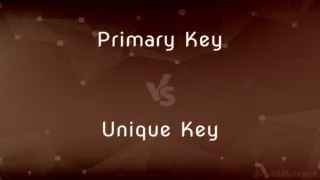Explore Into vs. Explore — What's the Difference?
By Tayyaba Rehman — Published on November 21, 2023
"Explore" means to investigate or traverse unfamiliar territories or subjects, while "Explore Into" is less standard and suggests a deeper or more specific investigation. Both emphasize discovery.

Difference Between Explore Into and Explore
Table of Contents
ADVERTISEMENT
Key Differences
"Explore" is a commonly used term in the English language. It conveys the act of investigating, traversing, or examining unfamiliar territories or subjects. On the other hand, "Explore Into" is not as standard in usage. While the intent behind "Explore Into" might be to emphasize a deeper or more specific investigation, it can sometimes be redundant, as "explore" by itself often captures the essence of detailed investigation.
For example, if one were to say, "I want to explore the Amazon rainforest," the sentence is clear and to the point. Contrastingly, "I want to explore into the Amazon rainforest" seems somewhat repetitive. The word "Explore" already implies a deep engagement or investigation, and adding "into" doesn't necessarily strengthen that implication.
However, in certain contexts, "Explore Into" can be used to emphasize a dive into a particular aspect of a broader subject. For instance, "While many explore the general history of World War II, she decided to explore into the resistance movements in Eastern Europe." In this case, "Explore Into" works to highlight the specificity of the subject being investigated.
That being said, in most contexts, "Explore" is sufficient and the more universally accepted term. While "Explore Into" might occasionally find its place in specific contexts or stylistic choices, it's essential to recognize that "Explore" already carries with it the connotation of depth, engagement, and thorough investigation.
Understanding the nuances between "Explore" and "Explore Into" is vital for effective communication. While the latter can sometimes be seen as a linguistic embellishment, the former is universally understood and often preferred for its clarity and conciseness.
ADVERTISEMENT
Comparison Chart
Standard Usage
Less standard
Commonly used
Implication
Deeper or specific investigation
General investigation or traversal
Redundancy
Can be redundant
Concise and to the point
Contextual Suitability
Specific contexts or stylistic choices
Almost all contexts
Connotation
Sometimes emphasizes specificity
Broadly encompasses discovery and investigation
Compare with Definitions
Explore Into
To investigate a specific aspect of a subject.
She decided to explore into the intricacies of quantum physics.
Explore
To engage in discovery or detailed examination.
Scientists continue to explore the vastness of space.
Explore Into
A non-standard way of emphasizing deeper research.
He wanted to explore into the lesser-known tales of Greek mythology.
Explore
To journey through unknown or lesser-known areas.
He set out to explore the dense forests of the Amazon.
Explore Into
To emphasize focus on a niche area.
The travel show decided to explore into the hidden caves of Thailand.
Explore
To seek knowledge or experience in new areas.
She aspires to explore different cultures around the world.
Explore Into
To dive into a particular portion of a larger topic.
The historian chose to explore into the reign of King Henry VIII.
Explore
To investigate or traverse unfamiliar territories or subjects.
I wish to explore the ancient ruins of Rome.
Explore Into
A linguistic choice to highlight detailed examination.
The scientist was eager to explore into the mysteries of dark matter.
Explore
To immerse oneself in learning or experiencing something new.
Artists often explore various mediums to express their creativity.
Explore
To investigate systematically; examine
Explore every possibility.
Explore
To search into or travel in for the purpose of discovery
Exploring outer space.
Explore
(Medicine) To examine (a body cavity or interior part) for diagnostic purposes, especially by surgery.
Explore
To make a careful examination or search
Scientists who have been known to explore in this region of the earth.
Explore
To seek for something or after someone.
Explore
(transitive) To examine or investigate something systematically.
The committee has been exploring alternative solutions to the problem at hand.
Explore
(transitive) To travel somewhere in search of discovery.
It was around that time that the expedition began exploring the Arctic Circle.
Explore
To examine diagnostically.
Explore
(transitive) To (seek) experience first hand.
It is normal for a boy of this age to be exploring his sexuality.
Explore
(intransitive) To be engaged exploring in any of the above senses.
He was too busy exploring to notice his son needed his guidance.
Explore
(intransitive) To wander without any particular aim or purpose.
The boys explored all around till cold and hunger drove them back to the campfire one by one.
Explore
(transitive) To seek sexual variety, to sow one's wild oats.
Explore
(colloquial) An exploration; a tour of a place to see what it is like.
Explore
To seek for or after; to strive to attain by search; to look wisely and carefully for.
Explores the lost, the wandering sheep directs.
Explore
To search through or into; to penetrate or range over for discovery; to examine thoroughly; as, to explore new countries or seas; to explore the depths of science.
Explore
Inquire into
Explore
Travel to or penetrate into;
Explore unknown territory in biology
Explore
Examine minutely
Explore
Examine (organs etc.) for diagnostic purposes
Common Curiosities
Is "Explore" more universally accepted?
Yes, "Explore" is more commonly used and recognized in various contexts.
When might one use "Explore Into"?
"Explore Into" can be used to emphasize investigating a specific aspect of a broader subject.
Does "Explore Into" have a place in language?
While not standard, "Explore Into" might be used for stylistic choices or specific contexts.
Does "Explore" encompass the act of discovery?
Yes, "Explore" broadly encompasses the acts of discovery, investigation, and traversal.
Do both "Explore Into" and "Explore" relate to investigation?
Yes, both terms relate to investigation, with "Explore Into" emphasizing specificity.
Is "Explore Into" standard English?
"Explore Into" is less standard than "Explore" and can sometimes be redundant.
Can "Explore" indicate deep investigation?
Yes, "Explore" by itself often implies a thorough or deep investigation.
Can "Explore Into" be seen as repetitive?
In many cases, "Explore Into" can be seen as redundant since "Explore" already implies investigation.
Which term is more concise?
"Explore" is more concise and direct compared to "Explore Into."
Is "Explore Into" grammatically correct?
While understandable, "Explore Into" can often be replaced with the more grammatically preferred "Explore."
Share Your Discovery

Previous Comparison
Volvo S40 vs. Volvo S60
Next Comparison
Primary Key vs. Unique KeyAuthor Spotlight
Written by
Tayyaba RehmanTayyaba Rehman is a distinguished writer, currently serving as a primary contributor to askdifference.com. As a researcher in semantics and etymology, Tayyaba's passion for the complexity of languages and their distinctions has found a perfect home on the platform. Tayyaba delves into the intricacies of language, distinguishing between commonly confused words and phrases, thereby providing clarity for readers worldwide.













































